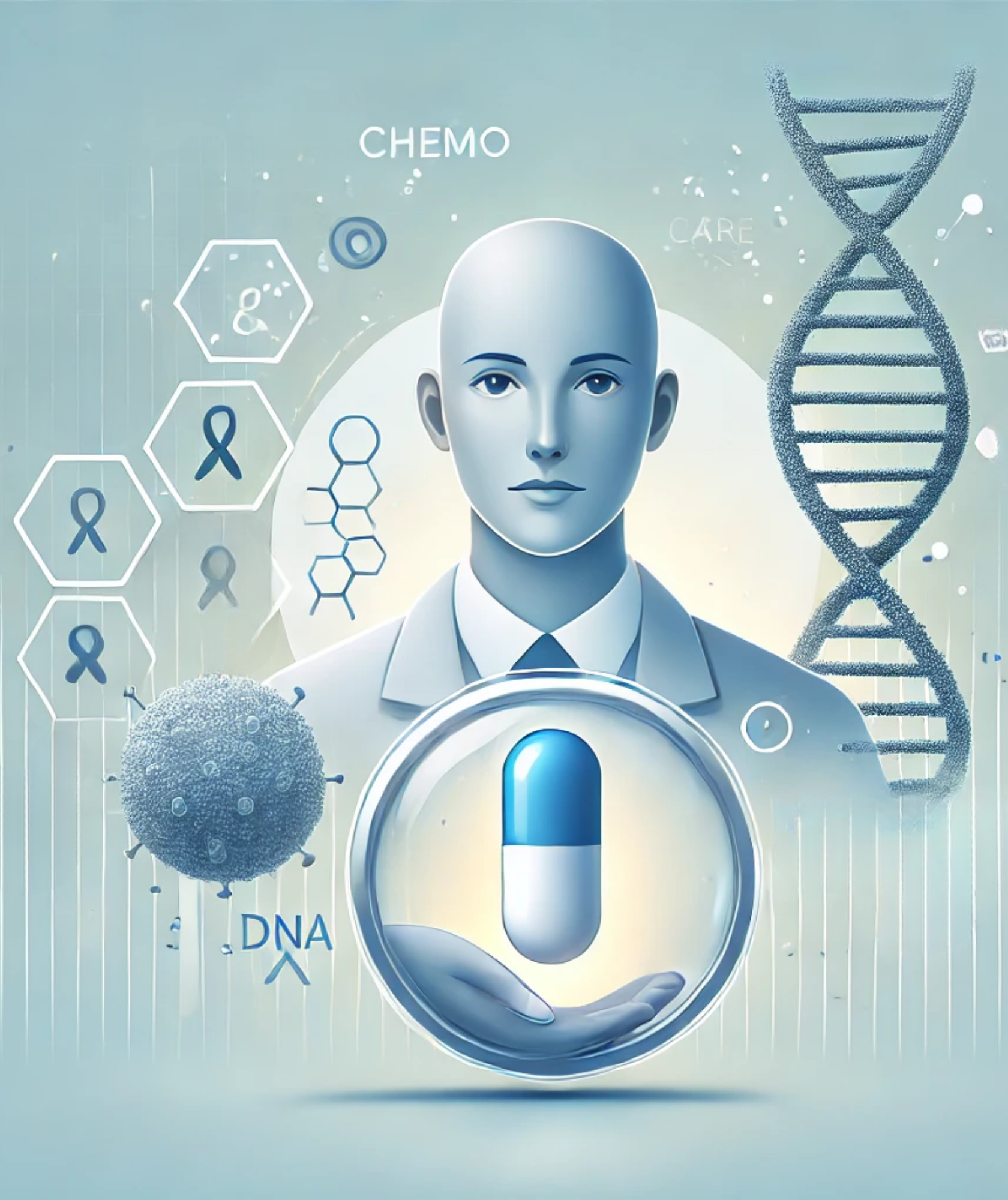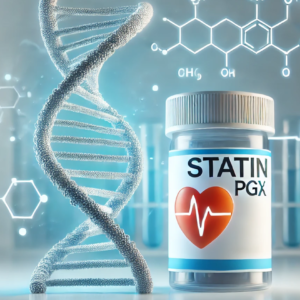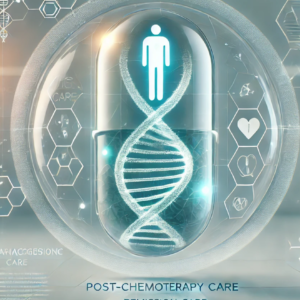The Only Chemo Drugs Test
The Only Chemo Drugs Test is a cutting-edge solution tailored to optimize the use of chemotherapy drugs through advanced DNA testing for chemotherapy drug response. By analyzing your genetic profile, this test uncovers key insights into how your body metabolizes chemotherapy medications, predicts potential side effects, and determines the most effective drug and dosage for your treatment. With the growing emphasis on precision cancer centers and gene-targeted therapy, this test bridges the gap between genetic science and personalized oncology care. Empowering patients and oncologists alike, the pharmacogenomics of chemotherapy medications enhances treatment outcomes, minimizes risks, and supports safer, more effective cancer therapies. Furthermore, DNA testing for chemo side effect management plays a crucial role in minimizing unwanted reactions and ensuring a smoother treatment journey.
1. Who Should Take the Chemotherapy Pharmacogenomics Test?
This test is ideal for individuals who:
- Are undergoing or planning to undergo chemotherapy for cancer treatment?
- Wish to minimize side effects and optimize the effectiveness of chemotherapy drugs.
- Have experienced severe or unexpected reactions to chemotherapy medications in the past.
- Want a personalized treatment plan based on their genetic profile to improve therapy outcomes?
- Are exploring precision oncology approaches for their cancer treatment.
2. Why Is This Test Important?
Chemotherapy is a cornerstone of cancer treatment, but its efficacy and side effects can vary significantly based on individual genetic factors. Understanding how your body metabolizes and responds to chemotherapy drugs is vital for optimizing care.
Key reasons why this test is essential include:
- Prevents Adverse Reactions: Genetic testing for managing chemotherapy side effects identifies variations in genes such as DPYD and UGT1A1, which influence how chemotherapy drugs are processed. This helps predict and avoid severe side effects.(2)(3)
- Personalized Drug Selection: The test ensures that the most suitable chemotherapy drugs are selected for your genetic profile, improving treatment efficacy.(4)
- Optimizes Dosage: Genetic insights enable healthcare providers to fine-tune drug dosages, enhancing safety and reducing toxicity.(5)
- Improves Outcomes: By aligning treatments with your genetic makeup, the test minimizes risks and maximizes the therapeutic potential of chemotherapy.(6)
Impact of chemo drugs and Genetic insights:
A study highlights the common adverse drug reactions (ADRs) associated with cancer chemotherapy, such as nausea, vomiting, constipation, hiccough, anorexia, alopecia, and hematological disorders, linked to drug regimens like Cisplatin, Cyclophosphamide, Paclitaxel, 5-FU, Doxorubicin, Vincristine, and Trastuzumab. It emphasizes the causality, severity, and preventability of these ADRs, with many cases being managed symptomatically, and underscores the importance of pharmacovigilance in ensuring safe and effective treatment, particularly in palliative cancer care.(1)
A study found that patients with a specific genetic variant (UGT1A1*28/*28) are more likely to experience severe side effects from the chemotherapy drug Irinotecan, even at moderate doses, highlighting the importance of genetic testing to predict individual responses to treatment and reduce the risk of harmful side effects.(7)
3. DrOmics Pharmacogenomics Test for Chemotherapy:
DrOmics leverages advanced technology and precision medicine to optimize chemotherapy outcomes. Our pharmacogenomics test analyzes key genetic markers to predict drug response and toxicity, providing personalized treatment recommendations tailored to your genetic profile. Developed using international CPIC and PharmGKB guidelines, it ensures accuracy and reliability. With actionable insights, our detailed reports enable oncologists to make data-driven decisions, minimizing side effects and enhancing your treatment experience and recovery journey.
| Drug | Disease |
| thioguanine | Acute leukemias |
| vincristine | |
| asparaginase | |
| mitoxantrone | |
| gemtuzumab ozogamicin | |
| idarubicin | |
| daunorubicin | |
| busulfan | |
| cytarabine | |
| dacarbazine | Advanced medullary thyroid cancer |
| fluorouracil | basal cell carcinomas |
| dasatinib | blood and bone marrow cancers |
| chlorambucil | blood cancers |
| temozolomide | brain cancer |
| thiotepa | breast cancers |
| docetaxel | |
| vinblastine | |
| epirubicin | |
| Platinum compounds | Multiple Cancers |
| antineoplastic agents | |
| topoisomerase I inhibitors | |
| Alkylating Agents | |
| egfr inhibitors | |
| corticosteroids | |
| radiotherapy | |
| platinum | |
| difluorodeoxyuridine | |
| fludarabine | |
| methotrexate | |
| vindesine | |
| doxorubicinol | |
| SN-38 | |
| everolimus | |
| oxaliplatin | stage III colon cancer. |
| rituximab | chronic lymphocytic leukemia |
| nilotinib | Chronic Myeloid Leukemia |
| raltitrexed | colon and rectal cancer |
| irinotecan | colorectal cancer. |
| FOLFOX | |
| trifluridine | digestive system cancers |
| mitotane | drenocortical tumors and Cushing’s syndrome. |
| tipiracil hydrochloride | gastric or colorectal malignancies |
| capecitabine | gastrointestinal including pancreatic cancer |
| pemetrexed | lung cancer |
| vinorelbine | |
| cyclophosphamide | lymphomas |
| panitumumab | metastatic colorectal carcinoma |
| anthracyclines and related substances | Neoplasms |
| gefitinib | non-small cell lung carcinoma |
| icotinib | |
| gemcitabine | ovarian cancer |
| paclitaxel | |
| topotecan | |
| carboplatin | |
| FOLFIRINOX | pancreatic cancer |
| melphalan | rare blood cancer |
| pazopanib | renal cell cancer |
| doxorubicin | Sarcoma cancers. |
| cisplatin | |
| oteracil | stomach cancer |
| tegafur | |
| etoposide | testicular and lung tumors |
| bleomycin | various malignancies |
4. How Does This Work?
- Sample Collection: A non-invasive DNA sample is collected using a simple cheek swab.
- Comprehensive Analysis: The sample undergoes advanced genetic testing to identify relevant markers influencing chemotherapy drug response.
- Detailed Reporting: A comprehensive report highlights your genetic predispositions, potential drug interactions, and recommended treatment adjustments.
- Expert Consultation: Results are reviewed with a genetic counselor or oncology specialist to create a personalized treatment plan tailored to your needs.






Reviews
There are no reviews yet.